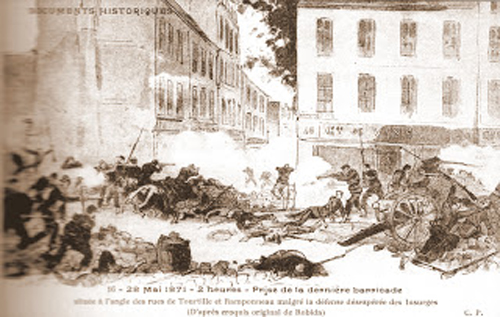The next day, Tuesday, the 23d, was warm and bright, and a terrible day it was for Maurice. The few hundred federates with whom he was, and in whose ranks were men of  manydifferent battalions, were charged with the defense of the entire quartier, from the quai to the Rue Saint-Dominique. . . .
manydifferent battalions, were charged with the defense of the entire quartier, from the quai to the Rue Saint-Dominique. . . .
About two o'clock Maurice heard that the tricolor was floating over Montmartre: the great battery of the Moulin de la Galette had succumbed to the combined attack of three army corps, which hurled their battalions simultaneously on the northern and western faces of the butte through the Rues Lepic, des Saules and du Mont-Cenis; then the waves of the victorious troops had poured back on Paris, carrying the Place Saint-Georges, Notre-Dame de Lorette, the _mairie_ in the Rue Drouot and the new Opera House, while on the left bank the turning movement, starting from the cemetery of Mont-Parnasse, had reached the Place d'Enfer and the Horse Market. These tidings of the rapid progress of the hostile army were received by the communards with mingled feelings of rage and terror amounting almost to stupefaction. What, Montmartre carried in two hours; Montmartre, the glorious, the impregnable citadel of the insurrection! Maurice saw that the ranks were thinning about him; trembling soldiers, fearing the fate that was in store for them should they be caught, were slinking furtively away to look for a place where they might wash the powder grime from hands and face and exchange their uniform for a blouse. There was a rumor that the enemy were making ready to attack the Croix-Rouge and take their position in flank. By this time the barricades in the Rues Martignac and Bellechasse had been carried, the red-legs were beginning to make their appearance at the end of the Rue de Lille, and soon all that remained was a little band of fanatics and men with the courage of their opinions, Maurice and some fifty more, who were resolved to sell their lives dearly, killing as many as they could of those Versaillese, who treated the federates like thieves and murderers, dragging away the prisoners they made and shooting them in the rear of the line of battle. Their bitter animosity had broadened and deepened since the days before; it was war to the knife between those rebels dying for an idea and that army, inflamed with reactionary passions and irritated that it was kept so long in the field. . . .
Hours passed, and still he fought on, but with a bitter feeling of distress, with no other wish than that he might die. If he had erred, let him at least atone for his error with his blood! The barricade across the Rue de Lille, near its intersection with the Rue du Bac, was a formidable one, composed of bags and casks filled with earth and faced by a deep ditch. He and a scant dozen of other federates were its only defenders, resting in a semi-recumbent position on the ground, infallibly causing every soldier who exposed himself to bite the dust. He lay there, without even changing his position, until nightfall, using up his cartridges in silence, in the dogged sullenness of his despair. The dense clouds of smoke from the Palace of the Legion of Honor were billowing upward in denser masses, the flames undistinguishable as yet in the dying daylight, and he watched the fantastic, changing forms they took as the wind whirled them downward to the street. . . .
His comrades, too, even those most zealous in the cause, had one by one stolen away, affrighted at the approaching prospect of being outflanked. At last he was left alone, stretched at length between two sand bags, his every faculty bent on defending the front of the barricade, when the soldiers, who had made their way through the gardens in the middle of the block, emerged from a house in the Rue du Bac and pounced on him from the rear.